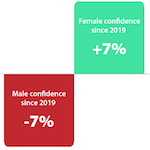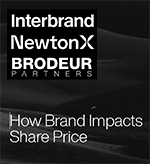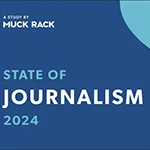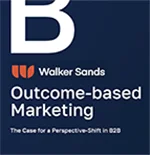 |
The confidence level of female leaders is on the rise, while male leaders are becoming less confident, according to the latest edition of Worldcom’s Global Confidence Index.
Female leaders saw their confidence level go up seven percent from 2019 to 2020, the index found, while male leaders experienced a seven percent drop. What had been a confidence gap of 16 percent in favor of male leaders 12 months ago has closed almost completely.
Overall, however, corporate leaders are becoming progressively less bullish each year. From 2019 to 2020, confidence levels fell eight percent, following a drop of 21 percent the previous year.
When it comes to topics, leaders are most assured about their ability to upskill and reskill employees successfully, and prospects for using technology to collaborate and innovate topped the list, both showing a 9.1 increase.
One surprise: confidence in the impact and role of the media was up 3.1 percent globally. That confidence varied widely from country to country, with the leaders in France having the most positive take on the media’s influence, followed by Japan and the US. Countries where the confidence in the media was down significantly include Mexico, Spain and Brazil.
In addition to measuring confidence, the Worldcom study also looked at the levels of leader engagement across a variety of topics. The topic showing the biggest jump in leader engagement was government and legislative change, which was up 78.7 percent. Crisis management (up 39.5 percent) and the impact on business of the way political leaders communicate on social media (up 35.5 percent) were also subjects in which corporate leaders are becoming increasingly interested.
The index also looks at which audiences are judged the most important by leaders. Influencers were named the most important audience by 24.47 percent, with customers (22.13 percent), employees (19.21 percent), government and legislators (16.07 percent) and shareholders (12.99 percent) following behind.
Worldcom’s study looked at leaders from 36 countries, and was compiled by Advanced Symbolics, a research company that employs artificial intelligence to create a representative understanding of what audiences are saying.
To see the full report, click here.


 Consumers who once demanded convenience now require consistent, multi-channel experiences that cater to them at every point. Brands must have a clear, audience-appropriate, and channel-specific voice across all platforms.
Consumers who once demanded convenience now require consistent, multi-channel experiences that cater to them at every point. Brands must have a clear, audience-appropriate, and channel-specific voice across all platforms. Employees at U.S. companies are experiencing high levels of burnout, but managers are lagging behind when it comes to their awareness of the problem
Employees at U.S. companies are experiencing high levels of burnout, but managers are lagging behind when it comes to their awareness of the problem Brand has a powerful effect on a company’s valuation, but the level of brand understanding in the investment community leaves a lot to be desired, according to a new study from Brodeur Partners, Interbrand and NewtonX.
Brand has a powerful effect on a company’s valuation, but the level of brand understanding in the investment community leaves a lot to be desired, according to a new study from Brodeur Partners, Interbrand and NewtonX. AI may still be viewed with a wary eye by most media pros, but its use is growing, according to a new study from Muck Rack.
AI may still be viewed with a wary eye by most media pros, but its use is growing, according to a new study from Muck Rack. A new study from Walker Sands says that some marketers have been putting the cart before the horse when it comes to the relationship between marketing channels and business outcomes.
A new study from Walker Sands says that some marketers have been putting the cart before the horse when it comes to the relationship between marketing channels and business outcomes.


 Have a comment? Send it to
Have a comment? Send it to 
No comments have been submitted for this story yet.